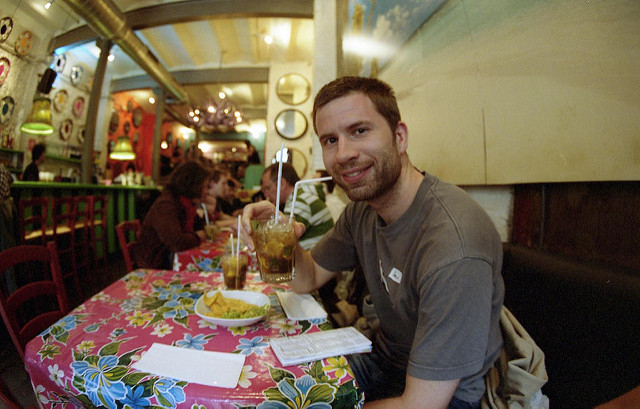Unlock the Magic in Your Story Now
Get the Free 20 questions to Ask Before Launching Your Idea workbook when you sign up for occasional updates.
Get the Free 20 questions to Ask Before Launching Your Idea workbook when you sign up for occasional updates.
Articles filed in: Storytelling
The Value Of An Internal Brand Narrative
filed in Marketing, Storytelling, Strategy
 In a commercial world, we use stories tactically to convince and convert prospective customers. We work hard to change minds and capture hearts, with persuasive words and evocative images in an attempt to make an emotional connection with the people we want to reach. The stories we tell our customers form our external narrative.
In a commercial world, we use stories tactically to convince and convert prospective customers. We work hard to change minds and capture hearts, with persuasive words and evocative images in an attempt to make an emotional connection with the people we want to reach. The stories we tell our customers form our external narrative.
We’re less aware of how the stories we tell ourselves shape our sense of meaning, purpose and agency about the journey we’re on. Our internal narrative creates value by helping us to make sense of the difference we’re here to create. It develops our brand’s identity, influences our behaviour and ultimately helps us to differentiate and realise our potential.
It’s easy to describe features and benefits and far harder to demonstrate what you stand for and why. Your goal should never be to invite a like-for-like comparison. It should always be to affirm the truth about what makes your brand incomparable and worthy of the customers you hope to serve.
Image by Arjun. V
Marketing Discernment
filed in Marketing, Storytelling, Strategy
 Much of our marketing is designed to convince or convert a customer in the moment. A particular colour applied to a ‘buy now’ button, the timely Instagram post or product placement at the checkout—tactics to get the lukewarm prospect over the line.
Much of our marketing is designed to convince or convert a customer in the moment. A particular colour applied to a ‘buy now’ button, the timely Instagram post or product placement at the checkout—tactics to get the lukewarm prospect over the line.
Our customer’s path to her decision is convoluted. It’s influenced by the story she tells herself. Her choices are shaped by regrets about the past, her challenges in the present and fears for the future. And yet, we market to her like she’s only considering the merits of what’s right in front of her eyes this second.
We mistakenly believe we always have the power to manipulate the decision to our advantage with a tactical nudge, forgetting that sometimes the factors influencing the decision are in motion long before we encounter the customer.
You will win some and lose some. Sometimes the losses happen long before you show up. The job of your marketing isn’t simply to help people to make up their minds. It’s to discern which people you can genuinely help.
Image by Thomas Hawk
What Do You Want Your Brand Story To Do?
filed in Marketing, Storytelling, Strategy
 What’s the role of storytelling in your business? What are you expecting your brand story to do? Most of us tell stories to describe the value we create. Storytelling is a tactic used to convince or convert prospects to customers—a way to close the sale. We’re selling the power of story short.
What’s the role of storytelling in your business? What are you expecting your brand story to do? Most of us tell stories to describe the value we create. Storytelling is a tactic used to convince or convert prospects to customers—a way to close the sale. We’re selling the power of story short.
Before they had words our ancestors told each other stories in paint and pictures on uneven stone walls. Storytelling has forever been the way we related to one another—how we connected, informed and inspired. Stories created a sense of belonging. They brought us closer.
That’s also the job of the brand stories we tell. Our stories signal belonging to the people who believe what we believe. It’s important to remember how the stories we live and breathe are shaped by the outcomes we pursue. You might make the sale by focusing relentlessly on tactics that support near-term goals. But in doing so you may miss the opportunity to forge lasting connections with the customers who will sustain your business over time. Significance scales.
Image by Bryn Pinzgauer
Why Not Make Something Great?
filed in Storytelling, Strategy, Success
 Like his grandfather, before him, Shane was in the textiles business. He made good socks for a living until the day he realised that pretty soon there would be no living to be made in a product that was good enough. His company was struggling to differentiate from and compete with big retailers who could manufacture and sell socks faster and cheaper. Shane realised their survival depended not on competing to make a comparable product only cheaper, but on understanding the customer who would be delighted by and pay more for the warmest socks in the world. Ten years on his business is thriving because he dared to rethink his business model.
Like his grandfather, before him, Shane was in the textiles business. He made good socks for a living until the day he realised that pretty soon there would be no living to be made in a product that was good enough. His company was struggling to differentiate from and compete with big retailers who could manufacture and sell socks faster and cheaper. Shane realised their survival depended not on competing to make a comparable product only cheaper, but on understanding the customer who would be delighted by and pay more for the warmest socks in the world. Ten years on his business is thriving because he dared to rethink his business model.
Without exception, whoever you are and wherever you’re reading this there’s one thing you have in common with every other person who is reading it too. You want your business or idea to succeed. You may not know exactly the path to that success, but you’re clear about the destination you want to reach.
Two things trip us up on the way to making our ideas matter. The first is our love affair with those ideas. The second is the fear of failure. In many cases, we’d rather press on uninformed and unenlightened than face the truth about the changes we may need to make to get to where we want to go. Because we invest so much of ourselves in our projects and businesses, the prospect of failure is painful. So we apply blinkers or look the other way hoping against hope that we were right all along. Blissful ignorance won’t help you to take your ideas from good enough to great.
The single biggest difference between a good product and a great one is the worldview and the posture of the person who created it. Instead of falling in love with their ideas they fall in love with their potential customers and users. They wonder what their customer cares about most. They look for problems to solve and unmet needs to fulfil. They strive to become indispensable by creating products and services that are not just useful, but meaningful. They’re not afraid to get it wrong because they know their missteps take them one step closer to getting it right.
We all have the potential to be that person if only we can lean into the doubts and dig deeper. That’s what I’m inviting you to do today. You can join me and other like-minded peers who are making their ideas matter by registering for The Story Strategy Course which starts on October 2nd. The course is self-paced, but you will have access to the platform and content as soon as you sign up, so you can get a head start. Be the exception. Take your idea from good to great.
Image of Fearless Girl by Shinya Suzuki
Three Pillars Of Great Branding
filed in Storytelling, Strategy
 There’s nothing extraordinary about the location of the vegetarian Mexican street food restaurant at the corner of a Fitzroy laneway. The tacos are good, not exceptional. The prices fair, not cheap. And yet, even on quiet Tuesday evenings, when other restaurants advertise specials to entice mid-week diners, the taco place has a steady flow of customers who come because of how being there makes them feel. The Mexican is no longer just another eatery, it’s become a beloved brand.
There’s nothing extraordinary about the location of the vegetarian Mexican street food restaurant at the corner of a Fitzroy laneway. The tacos are good, not exceptional. The prices fair, not cheap. And yet, even on quiet Tuesday evenings, when other restaurants advertise specials to entice mid-week diners, the taco place has a steady flow of customers who come because of how being there makes them feel. The Mexican is no longer just another eatery, it’s become a beloved brand.
Good branding is a promise. Great branding is a promise that’s fulfilled in a way that creates an emotional connection with the customer. Our promises can be made with a symbol, a taste or a sound. They can be spoken or silently enacted.
Great branding:
1. Creates an expectation.
2. Delivers a meaningful experience that matches the expectation.
3. Builds an emotional connection that compels customers to want to repeat the experience.
Every brand aspires to be more than ‘just another’ in their category. We become one-of-a-kind when we stop acting like ‘just another’ and do things that don’t always scale, with a touch of humanity.
* Registration for The Story Strategy Course is now open.
Image by Sigmund
The Limitations Of Marketing To Persuade
filed in Marketing, Storytelling, Strategy
 We assume sales and marketing are simply a case of fulfilling unspoken desires or unmet needs and making the people with those needs aware we’ve solved their problem.
We assume sales and marketing are simply a case of fulfilling unspoken desires or unmet needs and making the people with those needs aware we’ve solved their problem.
But there’s another piece of the marketing puzzle we often overlook—the doubts our customers must overcome. People don’t just want to know that our products and services exist or how they are better. They also need reassurance that the product enabled the change they are seeking. What most people care about isn’t making the right decision, it’s making the wrong one.
We market to persuade, often forgetting the place of marketing to reassure.
How are you ticking the reassurance box?
Image by Art DiNo.
What Do You Need More Of In Order To Succeed?
filed in Storytelling, Success
 If you had to pick one thing you need more of in order to succeed what would that be? Do you really need more time or more resources? Will more attention or more influence enable you to get to where you want to go?
If you had to pick one thing you need more of in order to succeed what would that be? Do you really need more time or more resources? Will more attention or more influence enable you to get to where you want to go?
When we dig deeper what we find we’re lacking isn’t cash or connections, it’s the courage and commitment to finish what we started. The story we tell ourselves and the lines we draw are a choice. What are you choosing to believe and act on today?
Image by Thomas Hawk
Anticipating The Next Move
filed in Storytelling, Strategy
 Every successful business strategy is dependent upon making a good decision about the next move. In a commercial world, we spend a lot of time planning to create growth. Often those plans rely on getting the customer to do what we want them to do—so we can make our next move.
Every successful business strategy is dependent upon making a good decision about the next move. In a commercial world, we spend a lot of time planning to create growth. Often those plans rely on getting the customer to do what we want them to do—so we can make our next move.
The businesses that not only survive but thrive are the ones that anticipate and obsess about the customer’s next move. They intentionally design products and services that take the customer where she wants to go. The brands we are devoted to now—Netflix, Airbnb, Amazon and on and on are masters of seeing us and planning for our next move.
When our future is dependent on our customers, it’s their likely next move that should inform our strategy.
Image by George Pachantouris
Louder Than Words
filed in Marketing, Storytelling
 We’re obsessed with finding the right words to communicate our value. We finesse our LinkedIn bios, agonise over product descriptions and sales pages. Of course, words have enormous power. But they are worthless without the actions that support them. It’s no good describing how great your product is if you haven’t put in the work to make sure it never disappoints.
We’re obsessed with finding the right words to communicate our value. We finesse our LinkedIn bios, agonise over product descriptions and sales pages. Of course, words have enormous power. But they are worthless without the actions that support them. It’s no good describing how great your product is if you haven’t put in the work to make sure it never disappoints.
Our stories are every bit as much about what we do as what we say. You have to work at being as good as the words you want to have the privilege of using.
What did you do today to tell your story?
Image by Niall Kennedy
What Do The Best Salespeople Do?
filed in Marketing, Storytelling, Strategy
 A young couple spent a while ‘just looking’ in the furniture store before approaching a salesperson to ask about fabric choices on a particular sofa. She showed them the swatches and said nothing. The guy asked if they had anything like it—a large squashy four-seater in leather. They didn’t.
A young couple spent a while ‘just looking’ in the furniture store before approaching a salesperson to ask about fabric choices on a particular sofa. She showed them the swatches and said nothing. The guy asked if they had anything like it—a large squashy four-seater in leather. They didn’t.
“What size exactly are you looking for?” she asked.
The couple didn’t know, but they started to describe the style of sofa they wanted.
Comfortable, not too formal.
“Come back to us once you have your measurements.” she smiled, as they walked out the door.
The salesperson didn’t ask, where they lived, in what type of house. She forgot to find out where the sofa would go, what they would mostly use it for and the number of people in their family. She lost the business because she prioritised the facts before the story. This doesn’t happen at IKEA.
Yes, the sofa has to fit in the room physically, but it has to fit with the customer’s wants, needs, hopes and dreams first. The best salespeople always start with the story.